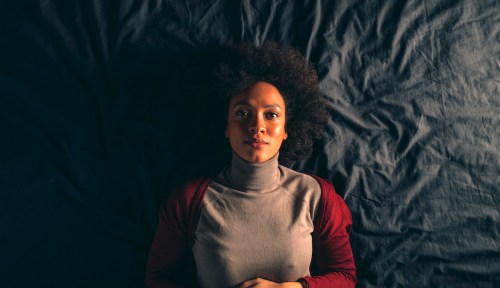Poor Sleep Can Make You More Irritable—Here’s How To Keep It From Grinching Your Holiday Cheer
A sleep doctor explains why poor sleep affects irritability, and how to keep your nightly routine intact while you're traveling.

We’ve all been there: You’re home for the holidays, and sitting at the breakfast table after your third bad night of sleep in a row, whether due to jet lag, stressful family dynamics, late-night celebrations, or the simple act of sleeping in a different bed. Someone says something inflammatory and, bam, you find yourself entrenched in an exhaustion-fueled argument. To be sure, there’s a connection between poor sleep and irritability, and, knowing this, sleep experts are here with tips to help you safeguard your relationships.
Experts in This Article
board-certified physician, certified sleep specialist, sleep coach, and founder of The Solution is Sleep
Sleep specialist Angela Holliday-Bell, MD, says that the holidays tend to create the perfect storm for fatigue-induced conflict—and it all starts with where you’re bunking. “You may not be sleeping in your normal sleep environment, which can often make it difficult to fall asleep as you normally would,” she says. (Confession: Just being separated from my gravity blanket makes me about 47 percent more likely to start a fight.) In addition to the scene change, you may also throw off your sleep schedule by staying up late chatting with the fam, eating high-sugar foods, or drinking alcohol that may interfere with your sleep. When these factors coincide, suddenly, you’re just skimping by with a few hours of sleep per night. And that’s simply not enough to be your best self.
But why does lack of sleep give us such a short fuse in the first place? Dr. Holliday-Bell says the reason why poor sleep affects irritability comes down to how the different parts of your brain talk to one another. “While you sleep, there is increased communication between your amygdala, the emotional control center of the brain, and your prefrontal cortex, which helps you control certain mental and executive functions. If you lose out on sleep, you get less of this communication and, thus, less regulatory function of the prefrontal cortex over the amygdala,” she explains. This may make you feel more irritable and can also cause your brain to trigger your fight or flight stress response more quickly. (Are all those Thanksgiving dinner hissy fits starting to make sense?)
Because no one wants to be the person who keeps spoiling the holiday fun, I asked Dr. Holliday-Bell how to put your best foot, er REM, forward as we move through the holiday season. Below, she offers her best advice for keeping your sleep routine up to snuff so that you don’t have to deal with the compounding effects of normal holiday stress and sleep exhaustion when you’re supposed to, you know, be merry.
Since we know why poor sleep affects irritability, practice these 4 tips to prioritize sleeping
1. Re-create your normal sleep environment
Do you like listening to white noise when you doze off? Love silk sheets? Prefer the right side of the bed? Regardless of where you’re going for the holidays, Dr. Holliday-Bell recommends keeping these rituals intact as best as you can. “Your mind makes strong connections between certain actions and sleep. Meaning, performing those actions or having those experiences signal to your brain that it’s time for bed and make it easier to wind down,” she says. While it may sounds a little high-maintenance to fly with your favorite pillow or the four books you like to keep on your bedside table, isn’t that better than picking a fight with the cousin you haven’t seen in five years? Having your creature comforts with you during the your travels may just make the difference between quality sleep and high irritability.
2. Be prepared to block out disturbing noises or lighting
“When you are in a different sleep environment, such as a relative’s home, you can’t control for all the factors you can at home, such as light or sounds that enter the bedroom at night. For that reason, I always recommend traveling with a blackout sleep mask and either ear plugs or bluetooth sleep headphones so that you can block out noise and light that may interfere with sleep,” says Dr. Holliday-Bell. BRB, going to get blackout shades shipped to my parents’ house.
3. Stick to your normal waking and sleeping schedule as best you can
Yes, it’s tempting to stay up late drinking eggnog and watching holiday movies—but Dr. Holliday-Bell recommends resisting the urge for the most part. “This can be tough because FOMO is real over the holidays, but you’ll be better off for it. I recommend trying to stick to within one hour of your normal sleep and wake times to keep a consistent circadian rhythm and decrease your risk of insufficient sleep and subsequent drowsiness or irritability,” she says. So, for example, maybe you stay awake for the annual viewing of Elf, but go to bed while everyone else is out re-enacting the drunk mailroom scene.
4. Try to stop eating at least two hours before bedtime
Give your body plenty of time to digest after so you don’t end up staring at the ceiling in the middle of the night. This shouldn’t be too big of a problem if your family eats Thanksgiving dinner at 3 p.m.—but it’s worth mentioning, anyway, for the benefit of busting potential irritability.
Oh hi! You look like someone who loves free workouts, discounts for cutting-edge wellness brands, and exclusive Well+Good content. Sign up for Well+, our online community of wellness insiders, and unlock your rewards instantly.
Sign Up for Our Daily Newsletter
Get all the latest in wellness, trends, food, fitness, beauty, and more delivered right to your inbox.
Got it, you've been added to our email list.










